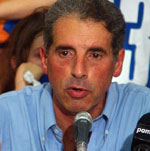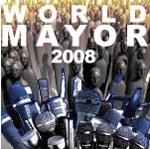
José Fogaça, Mayor of Porto Alegre

FRONT PAGE
About us

The 2010 results
The 2010 project
The 2010 finalists
Code of Ethics
The World Mayor Prize

The 2008 results
The 2008 project
The 2008 finalists
The World Mayor Award
Helen Zille thanks supporters
Mayors of Melbourne and Cape Town exchange letters
With Mayor of Cape Town
With Mayor of Zurich

On Mayor of Cape Town
On Mayor of Chacao
On Mayor of Gothenburg
On Mayor of Guayaquil
On Mayor of Marikina City
On Mayor of Memphis
On Mayor of Nuremberg
On Mayor of Phoenix
On Mayor of Porto Alegre
On Mayor of Tehran
On Mayor of Villa Nueva
On Mayor of Zurich

The 2006 results
Methodology
The 2006 finalists
The World Mayor Award
Dora Bakoyannis congratulates John So

The 2005 results
Contest methodology
List of finalists
Winning mayors write
Mayor Rama writes - Mayor Bakoyannis replies

The 2004 contest
List of all 2004 finalists
Edi Rama wins 2004 award
People ask - Edi Rama replies

Front Page
Site Search
About City Mayors
José Fogaça
Mayor of Porto Alegre (Brazil)
The nomination of Porto Alegre Mayor José Fogaça for the 2008 World Mayor Award has been widely welcomed by the people of his city. The vast majority of comments praise the work he has done so far. However, there have also been a few dissenting voices. Below we publish a representative selection of comments received about the Mayor of Porto Alegre.
FOR
Comment: Porto Alegre now is a politically peaceful city. Mayor Jose Fogaça began a new time of dialogue and understanding. In little communities, he says, democracy is basically cooperation. This is not so easy to happen. Porto Alegre was culturally and politically divided inside the poor communities: „To take my part, I have to deny the other one‚s‰. This was the culture: what I win, other one loses. Now, after three years of Mayor Fogaça administration, communities began to understand a non-adversarial democracy: cooperation inside communities do more than conflicts between their members. The Participatory Budget is not only kept just like it used to be, but now there is a lot of people in Regional Assemblies. Before Mayor Jose Fogaça Porto Alegre have had three years of deficit. That situation generated a lack of confidence in the Participatory Budget. Now, with a new model of management implemented by Mayor Fogaça, Porto Alegre has achieved three years of financial stability without decreasing the level of investments. An environment of confidence is recreated and people come again to the participatory budget assemblies.
Comment: Mayor José Fogaça is a poet. He's gentle as Guaiba lagoon waters. He fears nothing, except maybe the state governor.
Comment: This man put de city on the world map. Made new projects and administers the city with passion every day. He is a good man, very cultural and works hard to improve the city.
Comment: José Fogaça is the best statesman I ever seen. No doubt about it. Humility and sagacity bring us a great, perfect administration.
Comment: The Mayor has a great sense and a democratic spirit. His administration has kept the Participatory Budget and has started a new culture in city's society: the local solidarity governance, where government, community, third sector and all the actors are called to give their bit and to have responsibilities according to their own talents in order to build together a new city with all people involved not only as a subject of rights but also a subject with responsibilities to accomplish the city we want.
Comment: José Fogaça is a Democrat, who has sought to promote dialogue and social participation based on respect for plurality and the introduction of modern concepts of governance and co-responsibility
Comment: Jose Fogaça really changes the relationship between government and communities. He has kept the participatory budget, giving room just to his greatest opponents, playing with his opponents main political tool. He did it with deep sense of democracy. He changes the way politics is run in our country: first, blow out what the others had done. Today Porto Alleger is a city free of illiteracy. This was recently and officially recognized by the federal Secretary of Education. Porto Alegre is the first city of the state of Rio Grande do Sul (496 cities at all) in child care, concerning 0-6 years old children.
He promotes a new program: Local Solidarity Governance. The goal is implement a real change in communities behaviour, creating communities of responsibility and initiative, not only vindication communities. In Local Solidarity Governance the objective is to form social capital for the future. This is also sustainability. But what is making difference for sustainability and environment is the City Gates project, dramatic changes in public mass transportation in Porto Alegre. A strong reduction of carbon emission downtown, in a framework of public and private partnership. It worths to know this project. Take a look at it, if you have. IDB (International Development Bank) is so enthusiastic about this project that gave (free, needing no return) 500,000 dollars for technical cooperation. Other hit in Fogaça administration is the Social and Environmental Integrated Project, that wlll give life again to the Guahyba River.
In five years Guahyba River, that has been polluted by non-treated sewage since a half century, will accessible again to swimming.
Above all, Fogaça has been the mayor for cooperation and partnership.
Comment: As a university professor, José Fogaça was my teacher. He evolved to making practical all his believes on politics, democracy and governance. He is a very clever and pragmatic administrator.
Comment: Mr. Fogaça´s administration has been using moderns tools of public management, especially Balanced Score Card (BSC) and all its lines of work throughout municipal secretariats, showing the importance of a modern management to a better city.
Comment: Mr. Fogaça is a well know politics in Brazil and he is doing a brilliant job at Porto Alegre's City Hall. Anyone who has visited the website will acknowledge that the Local Solidarity Governance is an inclusive policy which is putting citizens at the heart of the municipal decisions. Mr. Fogaça, well done!
Comment: Mayor Fogaca has managed to keep important achievements his predecessor such as the participatory budget and created new concepts such as the solidarity governance giving real value to the social capital of the city.
Comment: Fogaça implemented a programme of control over-spending and rigorous supervision of the city without increasing tax rates. Finishing first two years of his administration with surplus, and breaking with the string of deficits occurred in the years 2002, 2003 and 2004, making our city could again be accredited in the search for new funding. With the donation of land for the Office of Mama - IMAMA, which operates in the fight against breast cancer, and for creating the office of women, the administration of Mayor Fogaça open spaces to improve the quality of life of women in the city of Porto Alegre. Fogaça has built more than 36 community nurseries in neighbourhoods in need of Porto Alegre, increasing in 2700 places for children from 0 to 6 years.
Comment: He is the best mayor Porto Alegre had in the past 20 years.
Comment: In order to take care of street children the ‘Street Action’ was created: 14 teams of approach and support to children and / or teenagers on the streets. The children are accompanied by social workers. As we cannot get them off the streets against their will because they have family, they are monitoring teams. All children are registered with information of where they live, who are their family, where they studied, etc. Whoever wants to know about any of them just have to contact the FASC (Foundation for Social Assistance). This year there has been a 40 per cent redeuction in the number of the children on the streets.
Against
Comment: I live in Porto Alegre and I can see no reason why Mr José Fogaça should be honoured with this prize. First, he changed his party after elected. I do not trust any politician who win an election with a party and change it soon later, with no apparent reason but personal interests. Secondly, I want tell an experience I had last year, when I passed some days hospitalised in the main municipal hospital of Porto Alegre. The comments of the people working there was very clear to me, indicating how the situation of the hospital got worse with Fogaça in government. It is not MY opinion, but the opinion of the professionals working in the hospital, who work there for years and saw many other mayors. They say that never before there was so lack of basic medical material, for example. I, personally, saw that they had to ask patient's relatives to bring some material, paying with their money, as geriatric diapers, for example. Ok, it is may be a common thing in undeveloped countries like Brazil, but we expect that things get better, not worse. I don't think many health professionals in Porto Alegre agree with his nomination. Finally, recently, it was implemented in Porto Alegre, an electronic system for bus ticket. Ok, better late than never. I know the electronic system of some other Brazilian cities and I have to say that the system implemented here is very inferior to the others I know. The system did not turn the payment more agile or practical. I do not say that things got worse here, but, no doubt, they lost a good opportunity to improve the things.

Some 205,000 people from across took part in the 2008 World Mayor Project

AFRICA
• Omar El Bahraoui, Rabat, Morocco
• Helen Zille, Cape Town, South Africa
• Amos Masondo, Johannesburg, South Africa
NORTH AMERICA
• Stephen Mandel, Edmonton, Canada
• Sam Katz, Winnipeg, Canada
• Martin Chavez, Albuquerque, USA
• Michael B Coleman, Columbus, USA
• Mufi Hannemann, Honolulu, USA
• Antonio Villaraigosa, Los Angeles, USA
• Willie W Herenton, Memphis, USA
• Manny Diaz, Miami, USA
• Raymond Thomas Rybak, Minneapolis, USA
• Phil Gordon, Phoenix, USA
LATIN AMERICA
• Julio César Pereyra, Mayor of Florencio Varela, Argentina
• José Fogaça, Porto Alegre, Brazil
• Juan Contino Aslán, Havana, Cuba
• Jaime Nebot, Guayaquil, Ecuador
• Paco Moncayo, Quito, Ecuador
• Salvador Gandara, Villa Nueva, Guatemala
• Antonio Astiazaran, Guaymas, Mexico
• Ernesto Gandara, Hermosillo, Mexico
• Ricardo Ehrlich, Montevideo, Uruguay
• Juan Barreto, Caracas, Venezuela
• Leopoldo Eduardo López, Chacao, Venezuela
ASIA
• Han Zheng, Shanghai, China
• Zhang Guangning, Guangzhou, China
• C M Sheila Dikshit, Delhi, India
• Fauzi Bowo, Jakarta, Indonesia
• Mohammad Baqer Ghalibaf, Tehran, Iran
• Tadatoshi Akiba, Hiroshima, Japan
• Hiroshi Nakada, Yokohama, Japan
• Marides Fernando, Marikina City, Philippines
• Vladimir Gorodets, Novosibirsk, Russia
• Park Wan-soo, Changwon City, South Korea
• Kadir Topbas, Istanbul, Turkey
EUROPE
• Patrick Janssens, Antwerp, Belgium
• Boiko Borisov, Sofia, Bulgaria
• Eleni Mavrou, Nicosia, Cyprus
• Bertrand Delanoë, Paris, France
• Pierre Albertini, Rouen, France
• Jens Böhrnsen, Bremen, Germany
• Ulrich Maly, Nürnberg, Germany
• Wolfgang Schuster, Stuttgart, Germany
• Kyriakos Virvidakis, Chania, Greece
• Sergio Cofferati, Bologna, Italy
• Walter Veltroni, Rome, Italy
• Rafal Dutkiewicz, Wroclaw, Poland
• Rosa Aguilar, Cordoba, Spain
• Göran Johansson, Gothenburg, Sweden
• Elmar Ledergerber, Zurich, Switzerland
